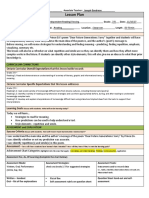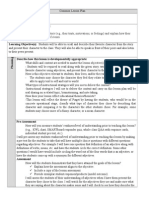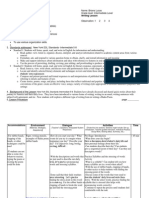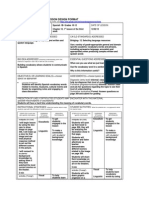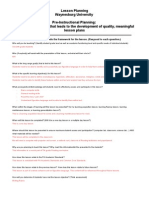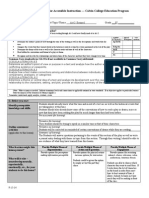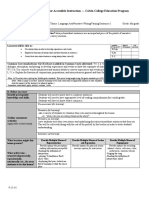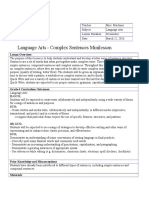Lesson5 2
Uploaded by
api-270339587Lesson5 2
Uploaded by
api-270339587Lesson Planning Form for Accessible Instruction Calvin College Education Program
Teacher
Date
Caitria Jade Cunningham
10/9/14
Subject/ Topic/ Theme
Musical Projects
Grade _HS Sophomores______________
I. Objectives
How does this lesson connect to the unit plan?
This lesson helps the students continue to develop their musical scenes. It will also better help them continue to understand how theatre works, this time moving into
body language as well as musicality.
cognitiveR U Ap An E C*
Learners will be able to:
Students will be able to explain how body language and stage devices can affect meaning.
Students will be able to explain how various literary devices work in Shakespeare, poetry, music, and theatre.
Students will be able to describe how their musical scene stays true to the original scene and is transformed by their
changes.
Students will be able to give examples of how different word choices can affect meaning.
Students will be able to perform a scene in different ways to create different meanings.
An.
R., Ap.
Ap., E., C.
U., An.
U., Ap.
physical
development
socioemotional
X
X
X
Common Core standards (or GLCEs if not available in Common Core) addressed:
CCSS.ELA-LITERACY.RL.9-10.4 states that students ought to be able to analyze word choices and how they relate to the overall theme.
CCSS.ELA-LITERACY.RL.9-10.7 states that students ought to be able to compare a text through different media; for example, through a musical rather than a play.
CCSS.ELA-LITERACY.RL.9-10.1 states that students ought to be able use specific evidence in order to understand the overall theme of a text.
(Note: Write as many as needed. Indicate taxonomy levels and connections to applicable national or state standards. If an objective applies to particular learners
write the name(s) of the learner(s) to whom it applies.)
*remember, understand, apply, analyze, evaluate, create
II. Before you start
Identify prerequisite
knowledge and skills.
Outline assessment
activities
(applicable to this lesson)
In order to be successful in this lesson, students must be able to read at a basic level and be
comfortable asking questions as well as be able to use a dictionary and/or glossary. They will need to
have read some of Shakespeare sonnets and be familiar with some of the poetic devices he uses and
how they connect to the various themes. They will also need to be somewhat familiar with the oral
culture of poetry. They need to have read different parts of Twelfth Night and have started on their
musical projects.
Pre-assessment (for learning): The students will be assessed via their reading quiz to make sure they are caught
up and prepared for todays lesson.
Formative (for learning): The students will be assessed via their participation in the class activity and their use
of their reading time.
Formative (as learning): The students will be assessed on their ability to explain their scenes and choice of
acting style and defense of that choice.
Summative (of learning): The students will be assessed via their final musical projects, due at the end o
the unit.
Provide Multiple Means of
Representation
Provide options for perceptionmaking information perceptible
What barriers might this
lesson present?
What will it take
neurodevelopmentally,
experientially,
emotionally, etc., for your
students to do this lesson?
The students will read the scene,
watch the scene, and perform the
scene in multiple ways.
Students will be acting, working in
groups, and working individually
throughout the class period.
Provide options for language,
mathematical expressions, and
symbols- clarify & connect
language
Provide options for expression and
communication- increase medium
of expression
9-15-14
Provide Multiple Means of
Action and Expression
Provide options for physical actionincrease options for interaction
Students will be able to
perform, watch, and read the
scene.
Provide Multiple Means of
Engagement
Provide options for recruiting
interest- choice, relevance, value,
authenticity, minimize threats
The students should be engaged
because it is a game to guess the
acting style and it relates to their
final projects.
Provide options for sustaining
effort and persistence- optimize
challenge, collaboration, masteryoriented feedback
Students will be working in
various groups to complete the
in-class assignment.
Provide options for comprehensionactivate, apply & highlight
Materials-what materials
(books, handouts, etc) do
you need for this lesson
and are they ready to
use?
Provide options for executive
functions- coordinate short & long
term goals, monitor progress, and
modify strategies
Provide options for self-regulationexpectations, personal skills and
strategies, self-assessment &
reflection
Students will able to move
Students should be able to take
closer to their goal of creating a what they have learned and
musical scene and
apply them to their musical
understanding the medium of
scenes and recognize the
music and the theatre.
struggle if they cant.
I will need to have read and familiarized myself with Twelfth Night. I will need to be familiar with
Shakespeares timeline and the backstory for Twelfth Night. I will need to have researched
Shakespeares theatre and the oral culture of the time. I need to have project descriptions and rubric
sheets made. I need to have cards with various acting styles written on them.
The classroom will be set up in the usual U shape with the tables. An open space up front for acting
would be helpful.
How will your classroom
be set up for this lesson?
III. The Plan
Time
Components
2 min
5 min
Motivation
(opening/
introduction/
engagement)
10
min
10
min
15
min
9-15-14
Development
(the largest
component or
main body of
the lesson)
Describe teacher activities
AND
student activities
for each component of the lesson. Include important higher order thinking questions and/or
prompts.
1. Begin with a mindful minute. This should
1. Students should be still and silent for the
bridge the time between the hallway and
mindful minute. They should not be
the class nicely
talking, moving, or using technology.
2. Go around and ask each group what ideas
2. The students should report their ideas for
they have so far for their various scenes.
the scenes and write down others ideas.
3. Move into a reading quiz. Try to make
3. The students should take the reading quiz.
sure it is a pencil and paper quiz so that
There should be no talking. It is an
the students do not need to go to the lab.
individual assessment.
4. After the quiz, show a YouTube clip of
4. The students should watch the YouTube
another scene that they have read but not
clip quietly. They should discuss what
yet discussed. Make sure that this version
they watched and whether or not they
stays true to Shakespeares original word
understood it clearly. They should express
choices, at least as much as possible. Ask
concerns and ideas. Those who do not
the students how well they understood
participate ought to make notes of what is
what was happening. Did they understand
happening either on their keeping track
it better reading or seeing it? Why?
sheets or in their journals.
5. Ask for volunteers to act out a short scene
5. The students should volunteer for the
(students should be getting used to this
acting scene if they are comfortable. They
practice by now). Try to choose people
should take the the notecards and take a
who regularly volunteer; they will be
couple minutes to discuss how they could
comfortable acting out varieties of body
best perform. After the performance, the
language. Give each actor a notecard and
rest of the students ought to guess what
ask them to act that way without
style of acting the actors were using. They
explaining their card to the audience. Then
should then discuss the different effects of
6.
10
min
2 min
Closure
(conclusion,
culmination,
wrap-up)
7.
switch and give each a different card. Ask
the students to discuss how the
performances were different and have
them try to guess what was written on
each card.
Now have students get into their musical
groups to give them time to work. They
also have to decide what sort of acting
style(s) they may like to use throughout
the production of their musical scene.
After this, they should begin writing their
scripts. They ought to identify two poetic
devices they are using in those scripts and
explain why they chose to use those and
how they affect the overall
meaning/theme. The teacher ought to
facilitate and answer questions as
necessary.
As the time for class to end comes closer,
gather students back together and have
them take out their keeping-track sheets.
Briefly look over them for a completion
grade and then go over them together
also briefly so that time does not run out.
6.
7.
the different styles.
The students should work diligently in
their musical groups. They also have to
decide what sort of acting style(s) they
may like to use throughout the production
of their musical scene. After this, they
should begin writing their scripts. They
ought to identify two poetic devices they
are using in those scripts and explain why
they chose to use those and how they
affect the overall meaning/theme.
The students may talk as long as the
volume level stays low as the teacher
checks the completion grades.
Your reflection about the lesson, including evidence(s) of student learning and engagement, as well as ideas for improvement
for next time. (Write this after teaching the lesson, if you had a chance to teach it. If you did not teach this lesson, focus on the
process of preparing the lesson.)
I was not able to teach this lesson, but my conclusion while writing it was this: there is not enough time for this lesson. There will
never be enough time to accomplish everything within this lesson. Because these are only five lessons out of a full month-long unit
(but they are the highlight lessons and the ones I designed), this lesson would more than likely spill into at least two more days.
Basically, the problem is this: the students need way more time to work on their musical scenes than ten minutes at the end of two
classes. If we want them to do a good job, they need a full week to work. This would have been built into the calendar, and it is one
of the many reasons we ran out of time to do this project. However, these lessons do one thing very well: they give the students the
tools they need in order to complete this project successfully. I wish I could have taught this lesson; it is very transferable to viewing
images, advertisements, and basically any visual and/or auditory media. The students would have been immersed in Shakespeares
world because they would be complicit in the creation of Shakespeares world.
9-15-14
You might also like
- Full Practicum Lesson 1 - Onomatopoeia 1No ratings yetFull Practicum Lesson 1 - Onomatopoeia 19 pages
- Millicent Atkins School of Education: Common Lesson Plan TemplateNo ratings yetMillicent Atkins School of Education: Common Lesson Plan Template4 pages
- La Plan 8 Wishtree Visual Journals Concrete PoetryNo ratings yetLa Plan 8 Wishtree Visual Journals Concrete Poetry5 pages
- Millicent Atkins School of Education: Common Lesson Plan Template100% (1)Millicent Atkins School of Education: Common Lesson Plan Template37 pages
- Millicent Atkins School of Education: Common Lesson Plan TemplateNo ratings yetMillicent Atkins School of Education: Common Lesson Plan Template4 pages
- Haiku and Cinquain Lesson Plan - OGER Landscape Orientation100% (2)Haiku and Cinquain Lesson Plan - OGER Landscape Orientation5 pages
- Lesson Planning Form For Accessible Instruction - Calvin College Education ProgramNo ratings yetLesson Planning Form For Accessible Instruction - Calvin College Education Program4 pages
- sp18 Common Lesson Plan Template - Whole Group LessonNo ratings yetsp18 Common Lesson Plan Template - Whole Group Lesson8 pages
- Year Level: Duration Learning Area Topic: Grade 3 Term 2 EnglishNo ratings yetYear Level: Duration Learning Area Topic: Grade 3 Term 2 English35 pages
- Aimee Eberhard Assignment 1 Tiered LessonNo ratings yetAimee Eberhard Assignment 1 Tiered Lesson6 pages
- ED 345 Calvin College Lesson Planning FormNo ratings yetED 345 Calvin College Lesson Planning Form4 pages
- Instructional Foundations The First Poem LessonNo ratings yetInstructional Foundations The First Poem Lesson4 pages
- SO5_Lesson 1 Anthology A Game of Polo_JCNo ratings yetSO5_Lesson 1 Anthology A Game of Polo_JC4 pages
- Lecture 8 PETRONELA-ELENA NISTOR LMA ENG-GERNo ratings yetLecture 8 PETRONELA-ELENA NISTOR LMA ENG-GER7 pages
- Marine Pollution Assignment 2 Inc. Front SheetNo ratings yetMarine Pollution Assignment 2 Inc. Front Sheet2 pages
- Components of The Smart Eye Glasses Price EstimationNo ratings yetComponents of The Smart Eye Glasses Price Estimation2 pages
- En Koodave Irum O Yesuve - Tamil Christian Song Keyboard Notation Notes PDF-Kve MusicNo ratings yetEn Koodave Irum O Yesuve - Tamil Christian Song Keyboard Notation Notes PDF-Kve Music1 page
- Amendment No 1 2002 To BS 7671 and Ring Circuits: BackgroundNo ratings yetAmendment No 1 2002 To BS 7671 and Ring Circuits: Background4 pages
- The Present Perfect Tense and Past PerfectNo ratings yetThe Present Perfect Tense and Past Perfect5 pages
- IMOmath - Functional Equations - Problems With SolutionsNo ratings yetIMOmath - Functional Equations - Problems With Solutions15 pages
- +2 English: Be Confident Model Public Exam - March 2023No ratings yet+2 English: Be Confident Model Public Exam - March 202319 pages
- KDS 14 20 64 Design Standard For Structural Plain ConcreteNo ratings yetKDS 14 20 64 Design Standard For Structural Plain Concrete11 pages
- FAR 113 Organic Chemistry: Practical 1 Preparation of P-Nitroacetanilide100% (2)FAR 113 Organic Chemistry: Practical 1 Preparation of P-Nitroacetanilide10 pages
- A Short Adaptation of James and The Giant PeachNo ratings yetA Short Adaptation of James and The Giant Peach13 pages
- Request For Quotation of Prices: LFN TradingNo ratings yetRequest For Quotation of Prices: LFN Trading5 pages
- MEDIATION TEAM’S SEVENTEENTH NOTICE AND REPORTNo ratings yetMEDIATION TEAM’S SEVENTEENTH NOTICE AND REPORT7 pages
